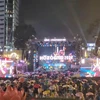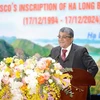Prime Minister Nguyen Tan Dung has asked Hanoi and other localities in the nation to build the Culture-Tourism Village of Vietnamese ethnic groups in Son Tay district of Hanoi into an attractive destination for foreign and domestic tourists.
Addressing the opening ceremony of the village in Hanoi on Sept. 19, PM Dung said that the village has helped enrich the nation’s culture.
Culture is the society’s spiritual foundation, said PM Dung, noting that the Party and the State always pay attention to preserving and promoting cultural identity.
Together with the State’s investment, all economic sectors should be encouraged to invest in cultural activities to help boost national development, said the PM.
The opening ceremony was attended by Party General Secretary Nong Duc Manh, Deputy Prime Minister Nguyen Sinh Hung, Chairman of the Vietnam Fatherland Front Central Committee Huynh Dam, Minister of Culture, Sports and Tourism (MCST) Hoang Tuan Anh, Minister and Chairman of the Committee for Ethnic Minority Affairs Giang Seo Phu, Chairman of the Hanoi People’s Committee Nguyen The Thao, cultural researchers and village patriarchs from across the country.
Located on a 1,544-ha area in Dong Mo , Son Tay district, the village is a complex of traditional Vietnamese architectures, highlighting unique characteristics of the national culture.
The Vietnamese Ethnic Culture-Tourism Village project, approved by the Prime Minister in 2008, aims to honour and preserve the cultural value of Vietnam ’s 54 ethnic minority groups and promote Vietnam ’s images to the world. It is also expected to become the nation’s culture, sports, and tourism centre featuring Vietnamese cultural heritage and meet the public’s demands for recreation.
On the threshold of the Thang Long – Hanoi millennial anniversary, the opening of the village is a politically, culturally, and socially significant event to meet the public’s demand for preserving the nation’s cultural value.
On the same day, there were a variety of activities including a ceremony to honour the crafts villages of 54 ethnic minority groups, an exhibition showcasing products of the ethnic groups, and cultural exchanges between ethnic groups./.
Addressing the opening ceremony of the village in Hanoi on Sept. 19, PM Dung said that the village has helped enrich the nation’s culture.
Culture is the society’s spiritual foundation, said PM Dung, noting that the Party and the State always pay attention to preserving and promoting cultural identity.
Together with the State’s investment, all economic sectors should be encouraged to invest in cultural activities to help boost national development, said the PM.
The opening ceremony was attended by Party General Secretary Nong Duc Manh, Deputy Prime Minister Nguyen Sinh Hung, Chairman of the Vietnam Fatherland Front Central Committee Huynh Dam, Minister of Culture, Sports and Tourism (MCST) Hoang Tuan Anh, Minister and Chairman of the Committee for Ethnic Minority Affairs Giang Seo Phu, Chairman of the Hanoi People’s Committee Nguyen The Thao, cultural researchers and village patriarchs from across the country.
Located on a 1,544-ha area in Dong Mo , Son Tay district, the village is a complex of traditional Vietnamese architectures, highlighting unique characteristics of the national culture.
The Vietnamese Ethnic Culture-Tourism Village project, approved by the Prime Minister in 2008, aims to honour and preserve the cultural value of Vietnam ’s 54 ethnic minority groups and promote Vietnam ’s images to the world. It is also expected to become the nation’s culture, sports, and tourism centre featuring Vietnamese cultural heritage and meet the public’s demands for recreation.
On the threshold of the Thang Long – Hanoi millennial anniversary, the opening of the village is a politically, culturally, and socially significant event to meet the public’s demand for preserving the nation’s cultural value.
On the same day, there were a variety of activities including a ceremony to honour the crafts villages of 54 ethnic minority groups, an exhibition showcasing products of the ethnic groups, and cultural exchanges between ethnic groups./.



















